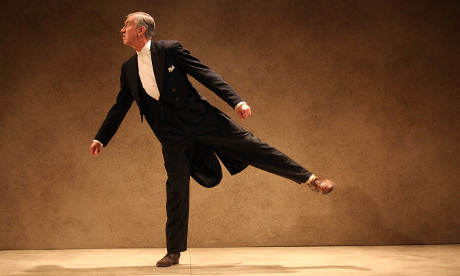Watt – a charged performance

Adapted for the stage - Samuel Beckett's Watt
Samuel Beckett’s Watt returns to the stage this month as Barry McGovern brings his 55-minute condensed adaptation of the legendary Irish playwright’s absurdist tale to the Barbican.
Initially performed in Beckett’s homeland, the Gate Theatre Dublin’s production, directed by Tom Creed, now comes to London hot on the heels of a well-received run at the Fringe last year.
One of Beckett’s earliest works and his second ever published novel, the story follows the main character, Watt, travelling from the train station to the house of the mysterious Mr Knott, where he will step into the role of butler. We are privy to his difficulties making sense of the world he sees around him, and the strange adventures he has along the way, as McGovern performs selected excerpts from the novel.
“I tried to précis the book in terms of performance rather than reading,” McGovern tells the Hackney Citizen. “It’s about trying to make sense of a world in which so-called normality is strange.”
Written while Beckett was in France during the Second World War, Watt is at once darkly comic and desperately pathetic. There are four sections to the story, divided into Watt’s journey to the house, his arrival at the manor as a new manservant, a surreal scene where he is trapped in solitary confinement and then, finally, a retrospective account of his journey to the asylum where the third part plays out.
The piece is written and performed with the bleak, gallows humour that came to define Beckett’s work. Heavily influenced by the experimental work of another of Ireland’s literary greats and one of the most influential writers of the Modernist movement, James Joyce, the narrative unwinds at a fantastical tangent to reality, sweeping us along with Beckett’s familiar retinue of bizarre bit-part characters, poetry and swirling word play.
“I like the fact that Beckett tells the truth about the human condition,” he says. “I hope audiences enjoy his wonderful humour and searing insight into what it is to be an outsider in a bewildering world.”
In Watt, Beckett satirises much that he was critical of in Ireland during his lifetime, including conservative attitudes to abortion under the eyes of the Catholic Church and small-town short sightedness. Lyrically the play experiments with sound repetition, made-up words and other word games and Joyce’s influence on Beckett is clear, as the poet and novelist ducks and weaves from pathos to deadpan philosophical humour.
McGovern is no stranger to Beckett’s work, appearing in another one-man show, I’ll Go On, as well as in more familiar classics such as Waiting for Godot, Endgame and Happy Days for the Gate Theatre. Performing on a bare stage with just chairs for props, he switches deftly between his role as the narrator and his tragic-comic portrayal of Watt himself in a highly energetic whistle-stop performance of the novel.
Watt
Until 16 March 2013
The Barbican
Silk Street
EC2Y 8DS
(McGovern is giving a post-show talk on his work and the play on 4 March).
